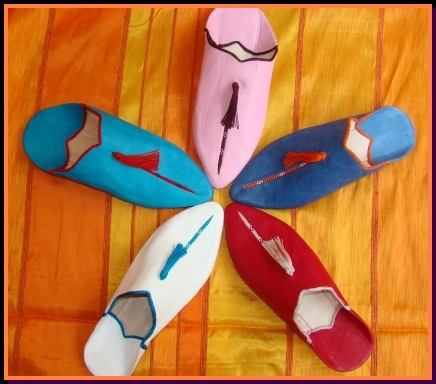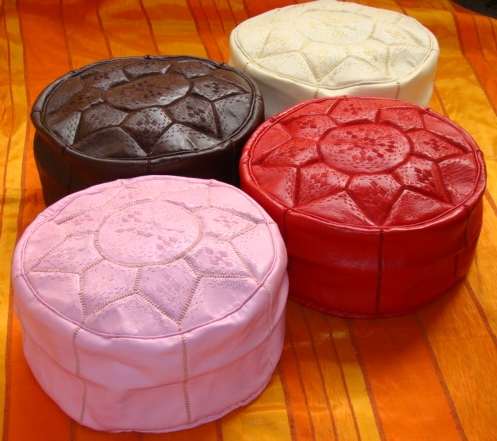Leder, eine marokkanische Leidenschaft
Leather, a Moroccan passion
People have been involved in leather-working
for eons, adapting it into whatever their hearts desired. A
‘living, breathing’ material that the passage of time
renders even more beautiful, leather has been inexorably linked
with Morocco since the XIVth century when Europeans fell head
over heels with the exceptional workmanship of our craftsmen,
even going so far as calling the goods fashioned leather as
“Maroquinerie”.
It’s impossible to pinpoint the date when the leather-working
actually began in Morocco. One thing for certain though, by the
IXth century, leather goods were being made throughout the
Kingdom for export primarily to Baghdad and the Middle East.
Clothing, harnesses, furniture, oriental slippers, bags and
magnificent book blinding…Leather lends itself to a myriad
of purposes, with its softness and hardwearing nature turning
every item into a delight. Different hides, different
applications in line with the leather own particular
characteristics: the softness of lamb leather for clothing
manufacture; thicker cow skin leather for bags, coats and
oriental slippers, and finally the more hardwearing nature of
goatskin perfect for pouffes and leather cushions.

Leather working techniques are becoming more refined, as is
creativity with leather. Embroidery, cutting/tooling…The
ingenuity of craftsmen/women seems limitless with different towns
specializing in certain skills: Marrakech for color embroidery
detail and fine leather straps, horse and camel saddles and
harnesses; Fez for gilding leather and Rabat for embossed leather.
Even now Fez and Marrakech still boast their tannery districts
with dyeing vats and industrious tanners providing an
extraordinary and timeless snapshot of their activities.
Nevertheless, these craftsmen have also understood the importance
of being open to new trends and influences, swinging from
tradition and authenticity to assimilate contemporary
developments in their endeavours.

Nowadays the softness and durability of leather has the bonus of
sophisticated execution and boundless creativity applied to the
adornment of pouffes, cushions, bags and oriental slippers with a
thousand and one subtle decorative details to delight and please
the eye.
Even better, in Morocco as everywhere in the world, leather goods
have crossed into the luxury market and fashion trends now have
an impact on shape, colour and materials used in their
manufacture.
No surprise then to sometimes lace-effect leather work or leather
adorned with pearls or metal trimming…as in designer
Frederique Birkemeyere’s pieces. Her unique collections of
cosmopolitan, eclectic, and stylish outfits, jackets and coats in
her “intensite nomade” boutique are a mirror image of
this Marrakech native, a woman who is passionate about beautiful
material and top quality workmanship. Attracted by the softness
and beauty of leather and suede, she is collaborating with
tanners to develop specific colours and ultra trendy materials
like patent-leather.
A leather producer for many centuries, Morocco has tweaked its
leather-working skills as time has gone by to suit the market.
And although tourists continue in their droves to stuff their
luggage with pouffes and colourful oriental slippers, Moroccan
leather goods also have secured their niche in top fashion and
accessory boutiques be they in the kingdom itself or abroad.
Leather-working in Morocco therefore has a bright future ahead.
By Alicia
Célerier
